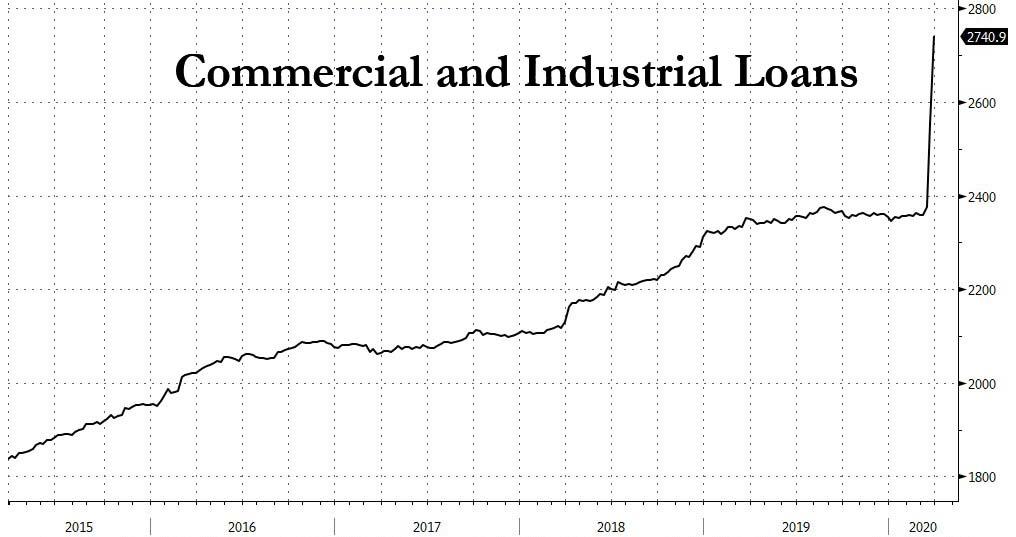With America's small and medium businesses suffering from cardiac arrest now that the economy is in a indefinite coma, it is hardly a surprise that the largest US bank, JPMorgan Chase has been inundated with more than 375,000 requests for $40bn of loans under the $350bn small business rescue scheme, a higher number of applications than any other bank, its consumer head Gordon Smith told President Donald Trump on Tuesday.
It is in this context that the FT reports that Chase has temporarily stopped accepting applications for small business loans outside the government's Paycheck Protection Program. A Chase spokeswoman told the FT that the bank was now devoting all of its small business underwriting resources to processing these applications and had "temporarily suspended" taking other applications from small businesses. The bank was continuing to process non-PPP applications already in train, she said, and would revisit the issue of new applications next week.
This means that any small business that have borrowing needs beyond the PPP's limits, or if they want to borrow for purposes beyond wage bills, they would need to seek other facilities or other lenders.
Ok fine, JPM is so busy trying to bail out mom and pop shops, it doesn't have time to deal with anyone else. Why is that a story? Here's why.
First of all, even before the Treasury announced it would hand out PPP loans to eligible business, the issuance of commercial and industrial loans exploded, and in the past month soared by nearly $400 billion, the fastest increase on record.

There is a good reason for this surge, and it has to do not only with a surge in demand but also supply - after all such loans are some of the highest margin products US commercial banks offer, in fact one can argue that it is not prop trading or frontrunning the Fed, but issuing loans that is the primary business of - you know - commercial banks!
Furthermore, loans are not only extremely profitable over their lifetime, they are also secured by assets, effectively eliminating downside risk for the bank lender. Said otherwise, of all bank products, these are the ones US commercial banks want to flow no matter what. One final point: bank lending is the most scalable, as it involves a minimum amount of upfront work which creates an extremely lucrative revenue stream since traditionally only a tiny percentage of loans default, at which point the bank's loan workout teams kick in.
Unless... that's no longer the case.
Which brings us to what is the much more likely reason why the largest US commercial bank has decided to suddenly no longer participate in the one product that is the bread and butter of large US commercial banks.
As a reminder, there is one way that PPP loans are unique - they are guaranteed by the Treasury, which means that JPMorgan carries absolutely no risk when it issues the loan. Worst case, the loan defaults and the bank issues a refund request to Uncle Sam, which then quickly makes JPM whole. Simple enough.
But all those other loans that flooded the system and are still flooding the system... see they don't have a government guarantee, they only have a loan-to-value, and if the value of the underlying assets is virtually nil - as would be the case in a depression and a wave of defaults, well... there goes your supply.
And even though loans normally pay generous interest over their lifetimes, that is not the case if JPMorgan's default assumptions have soared alongside the surge in new issuance.
Said otherwise, the only reason why JPMorgan would "temporarily suspend" all non-government backstopped loans such as PPP, is if the bank expects a default tsunami to hit coupled with a full-blown depression that wipes out the value of any and all assets pledged to collateralize the loans. Futhermore, why issue loans that will default in months if not weeks, just as bankruptcy courts fill up with millions of cases (assuming the coronavirus clears out by then, as the alternative is simply unthinkable - a default tsunami without any functioning Chapter 11 or Chapter 7 process) when JPM can simply stick to the 100% risk-free issuance of government-guaranteed small-business loans which pay a handsome 1% interest, especially if it makes JPM look patriotic by doing its duty to bail out America.
If indeed it is the case that JPMorgan is quietly stepping away from the non-government backstopped lender market, expect all other banks to soon do the same, and other big and not so big US banks such as BofA, Citi, and Wells Fargo to follow just as quietly in JPM's footsteps and halt loans to all small business across America due to fears of a default tsunami.
If that indeed happens, and if America is about to not only find itself locked out of normal-course funding, but flooded with thousands if not millions of corporate bankruptcies, what happens then? Will the Fed expand its functions to become a "bankruptcy court of last resort" for all of America and offer unconditional DIP loans to millions of small and medium businesses, while equitizing existing lenders (and making equityholders whole)?
Since this is unlikely, inquiring minds want to know just how bad will the US depression get over the next few months if JPMorgan has just put up a "closed indefinitely" sign on its window.
Commenti
Posta un commento